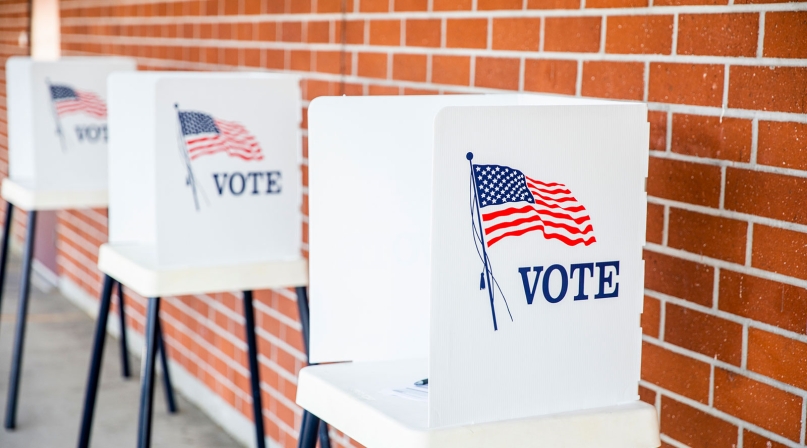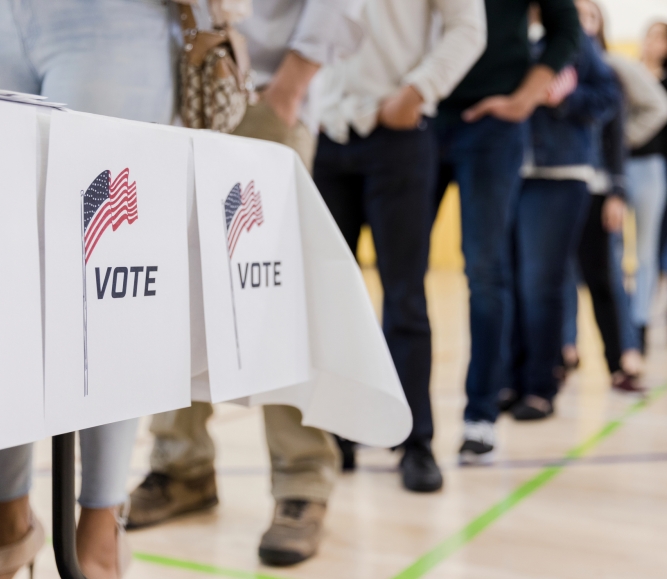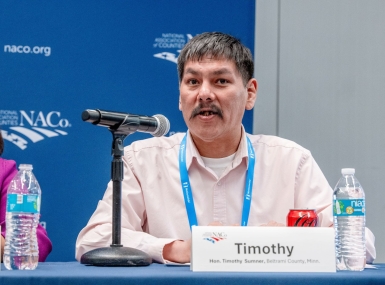August 1, 2024 is National Poll Worker Recruitment Day
Author

Paige Mellerio
Upcoming Events
Related News

Key Takeaways
August 1, 2024 is National Poll Worker Recruitment Day. As key intergovernmental partners in our electoral process, counties are traditionally responsible for recruiting, hiring and training poll workers to staff polling locations and to help citizens vote each election cycle. Additionally, poll workers are increasingly responsible for assisting election officials ensure polling sites are safe and secure.
- Did you know? Counties are responsible for funding and managing over 100,000 polling places staffed with over 630,000 poll workers each election cycle. Learn more here.
What is National Poll Worker Recruitment Day?
National Poll Worker Recruitment Day was established by the U.S. Election Assistance Commission (EAC) in 2020 to support civic education and encourage individuals to sign up to be a poll worker. The ability to recruit and retain high-quality individuals to serve as poll workers is an ongoing need for county election offices and is critical to the administration of federal, state and local elections.
This year on National Poll Worker Recruitment Day (August 1, 2024) counties are encouraged to use this day to promote poll worker opportunities throughout the community.
- For Example: Clarendon County, S.C. is promoting and hosting an open house at their voter registration & elections office on National Poll Worker Recruitment Day for residents to sign up to be poll workers
- The EAC’s free National Poll Worker Recruitment Day Toolkit, with customizable community outreach tools and templates, is available here.
How do Counties Recruit and Train Poll Workers?
While poll worker retention and recruitment is a typically local government responsibility, practices vary to accommodate for differing state laws and community needs. For example, a majority of states require counties to have parity in the political affiliations of poll workers, whereas in others like Oregon, where elections are conducted exclusively by mail, counties hire temporary workers to assist with mail processing but do not hire poll workers in the traditional sense.
Other examples include:
- Douglas County, Neb. utilizes a poll worker “draft,” like jury duty selection where individuals are randomly selected from a pool of registered voters and are required to appear and serve as a poll worker. Nebraska is the only state that allows counties to conduct such a draft.
- The Charleston County, S.C. Board of Voter Registration and Elections established “Day for Democracy” that gives Charleston County employees the opportunity to serve as a poll worker without using paid-time-off, which also fosters relationship building across the county.
- The Santa Fe County, N.M Clerk’s Office established a mentorship program for new presiding judges, or the poll workers appointed to oversee their respective polling locations, to shadow more experienced presiding judges as part of their training.
- The Clackamas County, Ore. Clerk and Elections Office used a Help America Vote Act College Program grant from the EAC to launch a Diversity in Democracy program to recruit, hire and train students from the local community college as poll workers.
How Can Congress Support Counties in Recruiting Poll Workers?
The U.S. Congress can support counties in recruiting and training poll workers by consistently and adequately funding grants for election administration. Help America Vote Act (HAVA) grants have not been funded consistently since they were authorized in 2002. Congress can also make existing federal workforce funds available to county governments available for poll worker recruitment activities.
- Learn more about HAVA grants here.
Additionally, the U.S. Congress should also ensure counties are able to access these funds directly and can be used at counties’ discretion to meet our most pressing needs. Currently, available federal funds to assist with election administration are only available directly to state election offices and counties can only access these funds through subgrants.
- Check out which states subgrant their HAVA funds to counties here.
Poll workers across the county are increasingly responsible for the physical security of polling locations and threats and harassment towards local election offices continue. Increased funds would assist counties in physical security upgrades to polling location and election offices, but NACo additionally urges the U.S. Congress to:
- Enact legislation to impose appropriate penalties for harassing and threatening election officials
- Expand protections from doxing to election officials and workers for a certain period before and after the election
- Support the affordable tools and trainings available to local officials through the EAC and the U.S. Cybersecurity and Infrastructure Security Agency (CISA)
Resource
The County Role in Elections: How Counties Administer Secure Elections

Related News

County Countdown – April 7, 2025
Every other week, NACo's County Countdown reviews top federal policy advocacy items with an eye towards counties and the intergovernmental partnership. This week features a budget reconciliation update, HHS restructuring and more.

NACo Legal Advocacy: Bondi v. VanDerStok
Garland v. VanDerStok has implications for the ability of county law enforcement to uphold public safety and investigate crimes involving ghost guns.
